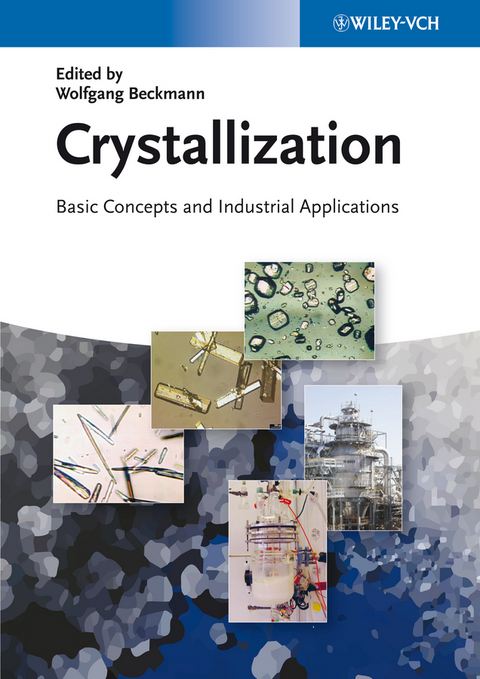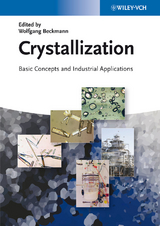Crystallization
Wiley-VCH (Verlag)
978-3-527-32762-1 (ISBN)
Crystallization is a natural occurring process but also a process abundantly used in the industry. Crystallization can occur from a solution, from the melt or via deposition of material from the gas phase (desublimation). Crystals distinguish themself from liquids, gases and amorphous substances by the long-range order of its building blocks that entail the crystals to be formed of well-defined faces, and give rise to a large number of properties of the solid.Crystallization is used at some stage in nearly all process industries as a method of production, purification or recovery of solid materials. Crystallization is practiced on all scales: from the isolation of the first milligrams of a newly synthesized substance in the research laboratory to isolating products on the mulit-million tonne scale in industry. The book describes the breadth of crystallization operations, from isolation from a reaction broth to purification and finally to tailoring product properties.In the first section of the book, the basic mechanisms - nucleation, growth, attrition and agglomeration are introduced. It ensures an understanding of supersaturation, the driving force of crystallization. Furthermore, the solubility of the substance and its dependences on process conditions and the various techniques of crystallization and their possibilities and limitations are discussed. Last but not least, the first part includes an intensive treatment of polymorphism . The second part builds on the basics, exploring how crystallization processes can be developed, either batch-wise or continuous, from solution or from the melt. A discussion of the purification during crystallization serves as a link between the two sections, where practical aspects and an insight using theoretical concepts are combined. Mixing and its influence on thecrystallization as well as the mutual interference of down-stream processes with the crystallization are also treated. Finally, techniques to characterize the crop are discussed.The third part of the book is dedicated to accounts of actual developments and of carried-out crystallizations. Typical pitfalls and strategies to avoid these as well as the design of robust processes are presented.
Wolfgang Beckmann is Senior Scientist at Bayer Technologies. Dr. Beckmann studied Chemical Engineering and Physical Chemistry in Germany and the US. He spent one year as Postdoctoral Fellow in Marseille. Wolfgang Beckmann has spent the last 20 years working at Bayer and prior to this at Schering, developing crystallization processes for pharmaceutical compounds. He has authored 3 chapters in books and approximately 50 publications in reviewed journals.
CRYSTALLIZATION: INTRODUCTION
MECHANISMS OF CRYSTALLIZATION
Crystal Lattice
Nucleation of Crystals
Growth and Growth Rate of Crystals
SOLUBILITY AND SOLUTION EQUILIBRIA IN CRYSTALLIZATION
Phase Equilibria and Phase Diagrams: General Issues
Melt Phase Diagrams
Solution Equilibria
AGGLOMERATION DURING CRYSTALLIZATION
Mechanisms and Kinetics of Agglomeration
Parameters Influencing Agglomeration
Agglomeration during Crystallization
Mechanical Properties of Agglomerates
POLYMORPHISM OF CRYSTALLINE SYSTEMS
Introduction and Definitions
Occurrence and Properties of Polymorphs and Solvates
Thermodynamics of Polymorphs of Solid-State Forms
Thermodynamics of Hydrates
Experimental Techniques to Elucidate Thermodynamics
Formation of Various Polymorphs and Solid-State Forms-Polymorph Screens
Selection of Optimal Form for Development
THE INFLUENCE OF ADDITIVES AND IMPURITIES ON CRYSTALLIZATION
Influence of Additives and Impurities on Crystallization
Influence of Impurities: Modeling
Tailor-Made Additives
Modeling the Influence of Solvents
PURIFICATION BY CRYSTALLIZATION
Introduction
Mechanisms of Impurity Incorporation and Purification
CHARACTERIZATION OF CRYSTALLINE PRODUCTS
Introduction
Characterization of Intrinsic Properties of a Solid
Characterization of Particle Shape and Size
Powder Flow Properties
In-Process Characterization
BASICS OF INDUSTRIAL CRYSTALLIZATION FROM SOLUTION
Generation of Supersaturation in a Crystallizer
Mass and Population Balance for Growth from Suspension
Operation of a Continuous Crystallizer: Basics
Operation of a Batch Crystallizer: Basics
DEVELOPMENT OF BATCH CRYSTALLIZATIONS
Setting Goals
Crystallization of Organic Moieties
Generation of Supersaturation in Batch Crystallizations
Initiation of Crystallization - Nucleation Phase
Seeded Batch Crystallizations
Crystallization Period
Scale-Up Considerations
Manipulating Particle Shape
CONTINUOUS CRYSTALLIZATION
Concept and Design of Continuous Crystallizers
Various Continuous Crystallizers
Periphery
Special Features of the Process
Adjustment of Suspension Densities
PRECIPITATION
Precipitation from Solution by Mixing Two Streams
Semi-Batch Precipitations
Model of Mixing during Precipitation
Precipitations Using Supercritical Fluids
Crystal Issues
Particle Size as a Function of Operating Conditions
MIXING IN CRYSTALLIZATION PROCESSES
Mixing in Batch and Continuous Crystallization Processes
Basic Mixing Tasks - Mixing Tasks in Crystallization
Impellers and Agitation Systems
Power Consumption of an Impeller System [2]
Blending
Suspending
Scale-Up of a Crystallization Process
DOWNSTREAM PROCESSES
Transfer of Suspension and Filter Cake
Solid?Liquid Separation
Drying
MELT CRYSTALLIZATION
Characteristics of Melt Crystallization
Processes of Melt Crystallization
Postcrystallization Treatments
Laboratory Techniques
EXAMPLES OF REALIZED CONTINUOUS CRYSTALLIZATION PROCESSES
Choosing the Drain Point in Process Design
Example Crop Crystallization for Organic Compounds
Example Crystallization of Table Salt
Results
DESIGN EXAMPLES OF MELT CRYSTALLIZATION
Concepts of Melt Crystallization
Outlook
INDEX
| Erscheint lt. Verlag | 20.2.2013 |
|---|---|
| Verlagsort | Weinheim |
| Sprache | englisch |
| Maße | 170 x 240 mm |
| Gewicht | 914 g |
| Themenwelt | Medizin / Pharmazie ► Pharmazie |
| Naturwissenschaften ► Biologie | |
| Naturwissenschaften ► Chemie | |
| Naturwissenschaften ► Geowissenschaften ► Mineralogie / Paläontologie | |
| Schlagworte | Biotechnologie i. d. Biowissenschaften • Biotechnology • Biowissenschaften • Chemie • Chemistry • Industrial Chemistry • Industrielle Chemie • Kristallisation • Life Sciences • Methods - Synthesis & Techniques • Methods - Synthesis & Techniques • Organische Chemie / Methoden, Synthesen, Verfahren • Pharmaceutical & Medicinal Chemistry • Pharmaceutical & Medicinal Chemistry • Pharmazeutische Chemie • Pharmazeutische u. Medizinische Chemie • Technische Chemie • Technische u. Industrielle Chemie |
| ISBN-10 | 3-527-32762-2 / 3527327622 |
| ISBN-13 | 978-3-527-32762-1 / 9783527327621 |
| Zustand | Neuware |
| Haben Sie eine Frage zum Produkt? |
aus dem Bereich




